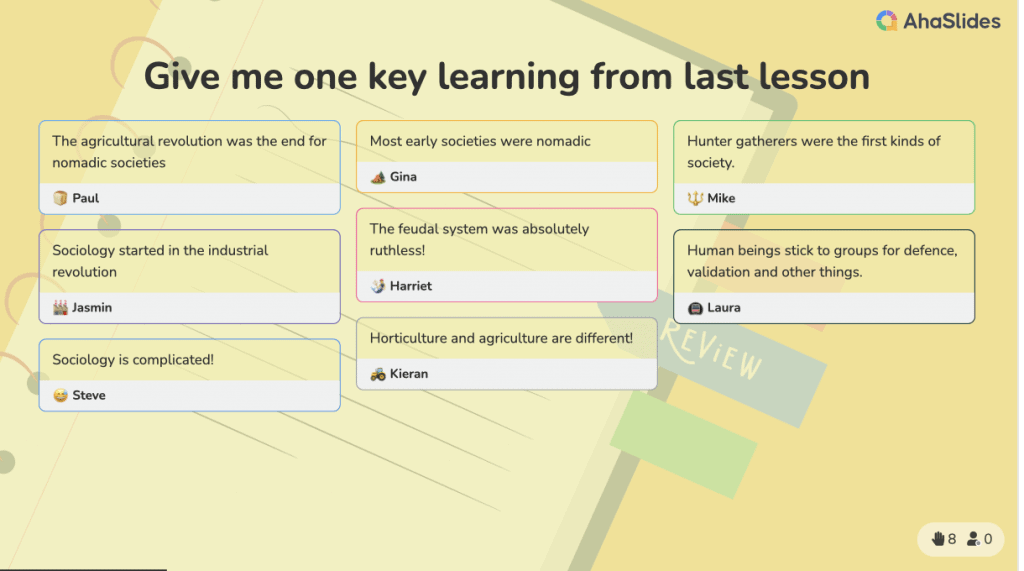Cognitive engagement is important in the learning process as it encourages learners to stay engaged in class and earn a deeper understanding of topics. Getting insight into this concept can help both the learning and teaching process more efficiently.

What is Cognitive Engagement?
It is defined as a psychological state in which learners remain motivated and are willing to try to understand a piece of knowledge and put it into practice. It also extends to the way learners try to go beyond the requirement and take challenges. It starts with emotional engagement (eagerness to learn), behavioral engagement (following rules and finishing assignments on time) social engagement (actively interacting with instructors), and ends at cognitive engagement (developing critical thinking and problem-solving).
According to Clarke, there are four main forms of cognitively engaged learning as follows:
- Self-regulated learning describes the ability of learners to understand and manage the learning environment, for example, by setting clear objectives and time management.
- Task focus, or task-oriented refers to the priority of getting the tasks done by the requirement deadline to achieve plan outcomes.
- Resource management involves the external resources and materials that learners use to optimize their learning process.
- Recipients focus on the concept that learners' performance can be improved by learning from teachers' feedback.
Tips for Better Engagement
What are Examples of Cognitive Engagement?
Here are a few examples of cognitive learning that might provide you with a clearer picture of the concept:
- Group study: One of the most common examples is a study with a group. Collaborating with peers or classmates to study and discuss academic topics can enhance cognitive engagement.
- Searching information on the Internet: With the popularity of the Internet and search engines, it is easy to collect and analyze thousands of related information in seconds, which are all excellent external sources to help learners get a deeper insight into a specific field.
- Purchase courses from e-learning platforms: Learners also cognitively engage in online courses that would help them improve their skills and professionalism. Purchasing courses shows their intention to learn and commitment to complete it.
- Active reading: Actively reading and engaging with the text promotes cognitive engagement. This includes highlighting important information, making annotations, asking questions, and summarizing key points.

Related:
What are the Benefits of Cognitive Engagement?
Cognitive Engagement is what all learners, teachers, and trainers are inclined to do, whether it is in school or in the workplace. It brings a lot of benefits to the learners and the organization, which are explained below:
Enhanced critical thinking skills
It encourages the development and refinement of critical thinking skills. By actively analyzing information, evaluating evidence, and considering different perspectives, individuals can improve their ability to think critically and make reasoned judgments.
Transfer of learning
This type of engagement also promotes the application and transfer of knowledge and skills to different contexts. When individuals are actively engaged in learning and problem-solving, they are more likely to develop a deeper understanding that can be transferred and applied in real-life situations
Increased collaboration and communication skills
In addition, many cognitively engaging activities, such as group discussions or collaborative projects, involve working with others. This promotes the development of collaboration and communication skills, as individuals learn to express their ideas, listen to others, and engage in constructive dialogue.
Tips to Improve Cognitive Engagement
There are many exceptional cognitive learning strategies helping you to improve the learning process both at school and at work. You should, at first, start by getting motivated and interested to learn, as well as seek out collaboration with others and collect feedback from instructors or trainers.
AhaSlides can be the best tool to help you solve the problems of dull learning or asociality, especially for virtual and open learning as it provides advanced features to connect people for discussion, ask questions, or get feedback in real-time. Likewise, the trainers, instructors, and teachers also can use AhaSlides tools to level up their courses and training to increase participants' cognitive engagement.

Frequently Asked Questions
What are the elements of cognitive engagement?
Four key components imply the quantity of cognitive engagement attention, effort, persistence, and time on task.
What is cognitive engagement in business?
In the workplace, cognitive engagement means an employee's ability to concentrate and put 100% effort into the task and the overall result.
What is cognitive customer engagement?
This concept focuses solely on creating a seamless, friction-free experience for customers, for some instances, understanding the primary reason customers contact a company in the first place.
Key Takeaways
Indeed, cognitive engagement extends beyond learning and education and is relevant in various aspects of life. When individuals actively engage their cognitive processes, it can positively impact problem-solving, decision-making, creativity, and overall cognitive abilities. Recognizing the importance of this notion can help individuals lead more fulfilling lives, continuously learn and adapt, and make informed decisions in various domains.
Ref: Research Gate








